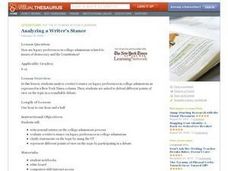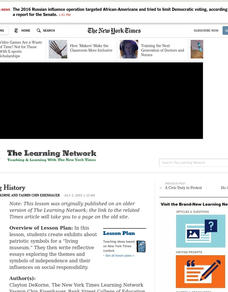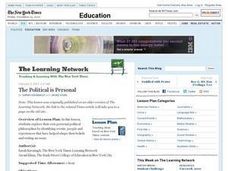Curated OER
Civil War Essay
Upper graders explore equality by writing an essay. They read the story Pink and Say by Patricia Polacco, and discuss the meaning of the story and its relevance to Civil War events. Learners investigate the five writing process steps and...
National Endowment for the Humanities
A Defense of the Electoral College
Each presidential election year, the debate about the electoral college rages. Michael C. Maibach's "A Defense of the Electoral College" offers young political scientists an opportunity to examine a reasoned argument for why the...
Virginia Department of Education
Writing for Workplace and Postsecondary Correspondence
Create or expand your college essay and career unit with a business and postsecondary writing activity. The exercise works for college-bound or job-hunting junior or senior learners. They bring their research concerning a college or...
Curated OER
A Personal Journey
Learners will share ideas about class mobility. They create a timeline that chronicles milestones in their own lives, and synthesize their learning by writing personal essays about their class status and aspirations for the future.
Curated OER
Confronting Two Challenges--One Physical, One Intellectual
Students examine the challenges of a new language and culture. In this cultural lesson, student read Running by Peter Hessler and discuss obstacles faced, including the language barrier. Students write an essay about a time they...
Curated OER
Family Life
What is family? Challenge your scholars to write an encompassing definition of what this word means to them. After reading "It May Be a Family Matter, But Just Try to Define Family," class members discuss the emotional issues surrounding...
Curated OER
Electoral College
Eleventh graders discover how the Electoral College works. In this presidential elections activity, 11th graders compare and contrast the Electoral College and popular vote as they participate in a classroom simulation. Students also...
Anti-Defamation League
Should Washington's NFL Team Change Their Name?
"What's in a name?" Is it irrelevant, as Juliet suggests in Shakespeare's play, or is nomenclature deeply significant? Young scholars weigh in on the debate by examining the controversy over the NFL's Washington, D.C. Redskins. Groups...
Heritage Foundation
The House of Representatives
The House of Representatives has a lot of responsibility in the United States government. But how did it all begin, and why is it the way it is now? A comprehensive lesson answers all of these questions about the US Constitution...
Curated OER
Analyzing a Writer's Stance
Should college admissions decisions be based on whether whose family members attended? Secondary students read and respond to a New York Times article on the issue of 'legacy preferences' in college admissions. Following class...
Curated OER
U.S. Constitution - Selecting the President
Young scholars study how the electoral college works to select a U.S. President. In this history lesson, students examine the U.S. Elector College methods then answer questions and write an essay that relate to the state where they...
Curated OER
Black Power
Use this New York Times lesson plan to research contemporary leaders in the African-American community. After reading the article "Blacks Weigh the Impact of the Post-Jackson Years," middle and high schoolers discuss the varying...
Curated OER
What a Relief!
How are disasters addressed by the Federal Government? This New York Times lesson, based on the article "Disaster Aid: The Mix of Mercy and Politics," prompts middle schoolers to discuss the idea of using a disaster declaration as a...
Curated OER
Keep Heritage Alive
Youngsters share ideas about cultural and/or spiritual rituals by participating in a fishbowl discussion, which explores the ways rituals have changed over time. They write reflective essays about their own cultural traditions.
Curated OER
Sparking History
Students create exhibits about patriotic symbols for a living museum. They write reflective essays exploring the themes and symbols of independence and their influences on social responsibility.
WE Charity
High School–Module 3: Food Waste
Advances in packaging and refrigeration help keep food fresher longer. That's just one of the ways science is addressing global food waste. With the third of five lessons from the WE Are Innovators—High School Modules set, scholars use...
WE Charity
High School–Module 5: Transportation Solutions
Planes, trains, and automobiles ... the abundance of today's transportation options comes at a hefty price. Using the fifth and final lesson plan from the WE Are Innovators—High School Modules set, pupils explore how modern...
Curated OER
Documenting Texas Women’s History through Photographs
Students explore women’s history. In this women’s studies lesson, students will examine seven photographs that depict prominent female figures from Texas’s history. Students will engage in a discussion of the photographs as a mode of...
Heritage Foundation
The Office of the Executive
An executive is not just a leader of a company; you can also use the term to describe the president of the United States. The ninth part of a 20-part unit teaches high schoolers about the importance of the executive branch and the...
Curated OER
The Political is Personal
Students examine their own political party affiliations and political beliefs. After reading an article, they discuss how students at Duke define their political philosophies. They brainstorm events, people and experiences that have...
Curated OER
By Any Other Name
Young scholars examine the differences between the definitions of race and ethnicity defined by the United States government. After reading an article, they discuss the possiblity of the elimination of some races from the 2010 census....
Curated OER
Mending the Rift
Learners determine what factors identify a country's political borders. After reading an article, they investigate questions surrounding the Great Rift Valley. On a map, they trace the valley from Asia through Africa and research the...
Curated OER
Closing the Gaps
Students examine the defining characteristics of their own generation. They apply their analysis to learning about previous generations, and synthesize their learning by creating improvisational skits and writing creative essays.
Curated OER
Guilty to a Fault
Students consider the moral and legal issues involved in distinguishing a verdict of murder from one of manslaughter (criminally negligent homicide) and write an essay describing the issues involved in the case that was researched.























